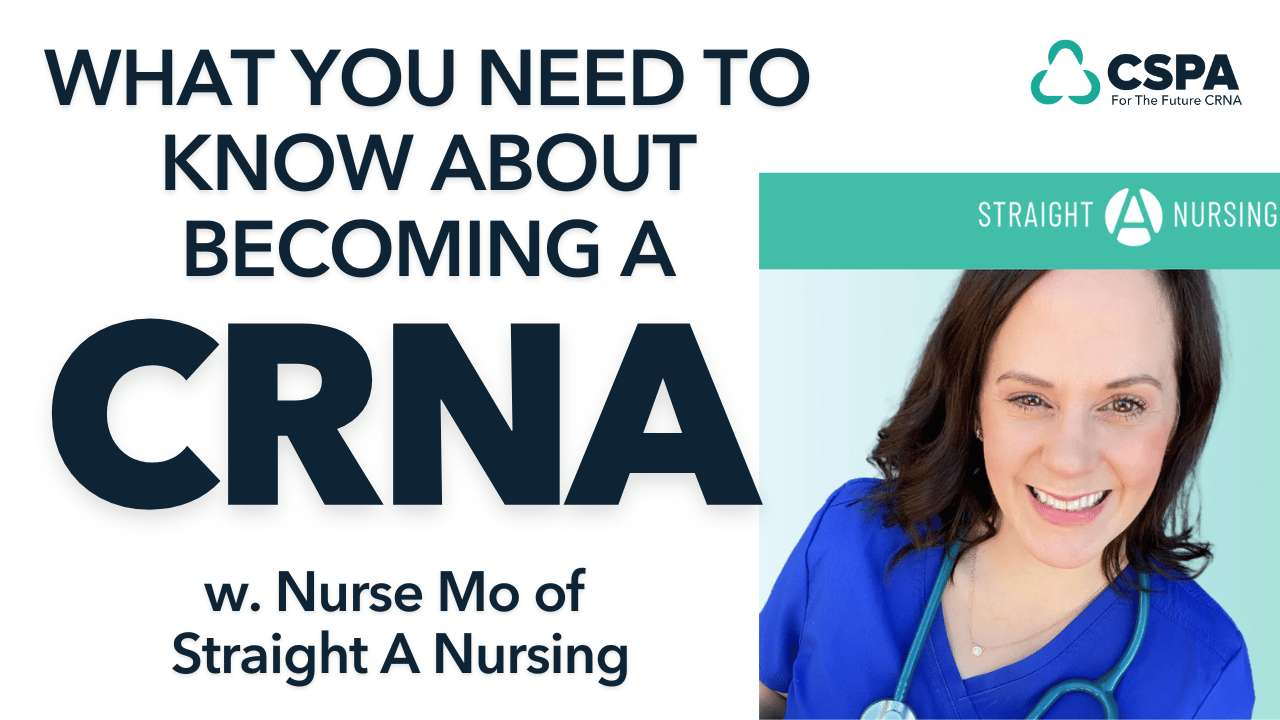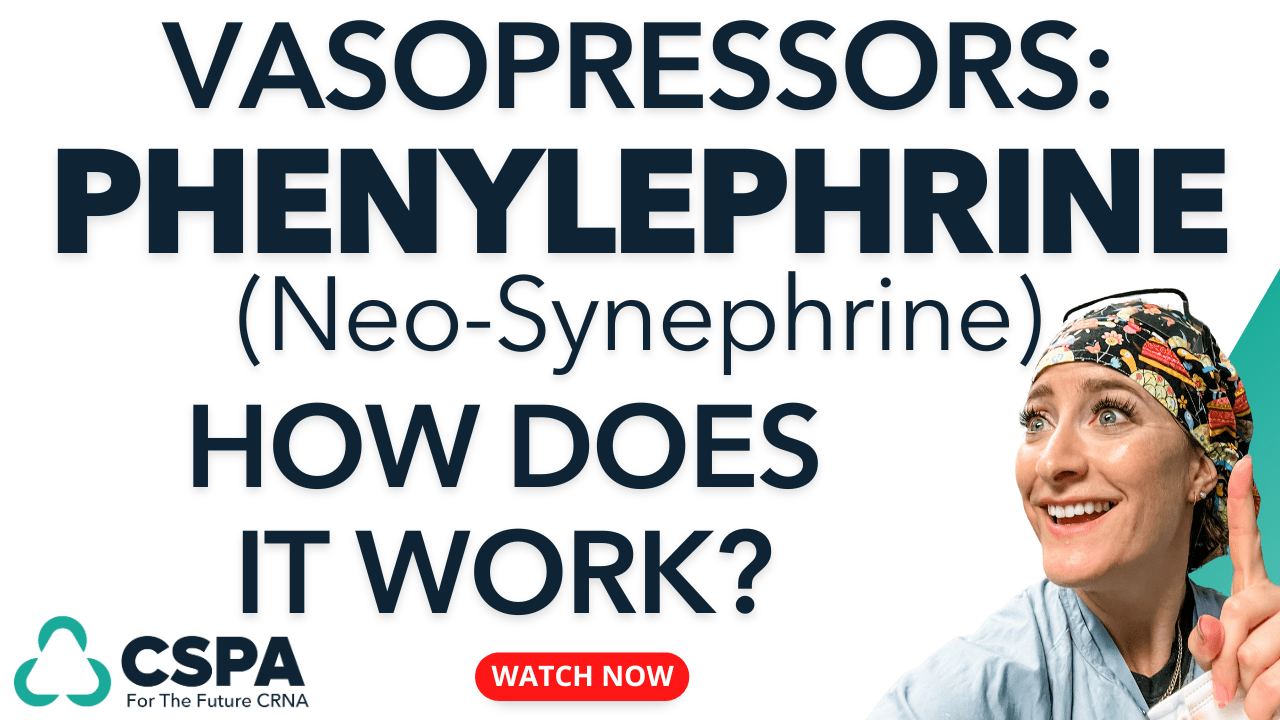
Get Your Free CRNA School Interview Prep Guide
Free CRNA School Interview Prep Guide Click Here
Succeeding as a CRNA isn’t only about the path you choose. It’s also about taking ownership of each step, shaping your story, and embracing the unique contribution you bring to the profession. In this episode, we discuss the details of applying and excelling in CRNA school with insights from the CRNA program faculty itself. We discuss how to choose a school that matches your aspirations and goals, instead of following a standard approach. We also share how to effectively communicate with CRNA programs, navigate complex CRNA school requirements, and write powerful emails that reflect your aspirations. This episode also touches on the GPA dilemma, ICU experience, the “tell me about yourself” interview question, and more. Tune in now and set yourself on the path to CRNA school success!
Thousands of nurses have gained CRNA school acceptance with CRNA School Prep Academy. Join today for access to all of the tools proven to accelerate your CRNA success! Click here:
https://crnaschoolprepacademy.com/join
Join the CSPA email list: https://www.cspaedu.com/podcast-email
Join the Free Facebook Community here! https://www.facebook.com/groups/crnaschoolprepacademyfree
Book a mock interview, resume or personal statement critique, transcript review and more: www.teachrn.com
—
Watch the episode here
Listen to the podcast here
CRNA Program Faculty Q&A Part 1
In this episode, we are going to reveal some Q&A from CRNA faculty members who were at our conference back in July of 2023. I’m so excited to share these gold nuggets with you. I want to stress too that this is based on four faculty and their opinions. However, what I have found through my time listening to faculty and hearing their advice is you can take these statements and generalize them, knowing that not all schools are going to have the same opinions, nor should they because there are unique programs out there, with the reassurance that you will find the right program for you.
It is important to know your schools and get to know the faculty because their advice is tailored such that it’s going to make sure that you know it’s a good fit for you to attend their program. I’m so excited to share with you this episode. I’m going to make these more general statements. If I have notes on what program had mentioned these comments, I will mention it but for the most part, I plan on making these general statements with some gold nuggets I took away from my note-taking.
If you’re watching on YouTube, you can see my notes. It’s sloppy. I’m the sloppiest note-taker ever. I always wonder why I can’t get a better system down and why I’m so sloppy. I don’t know how I can even follow some of the stuff I take notes on but it’s how I’ve always rolled. Without further ado, I’m going to be going into this.
I plan on probably breaking this up into part 1 and part 2. I will be cognizant of trying to release this episode back-to-back if we do that so that way, you don’t have to wait several months to hear the next part two. For those of you who are new to the show, welcome. For those of you who are loyal readers, welcome back. I’m so excited to have you back.
For those of you who have been around, you probably know my situation. I am pre-reporting these in a batch way. I will be going into the hospital in early September 2023 for a couple of months to be monitored every single day until we have our mono-mono twins. I encourage you to google mono-mono twins. They are a unique very rare occurrence but that is what we are pregnant with, identical twin girls, which we are very excited to hopefully welcome outside of my womb in October 2023. Their due date is September 2023. They will be about 32-week-old babies when they are born.
All that is exciting so I am batching these. I’m going to try my best to sprinkle these episodes in along with the current NARs that are doing episodes for the Academy as well while I’m taking a little bit of a break. I will be coming back into the swing of things hopefully early in 2024. In the meantime, some of these episodes that you will see me doing are going to be batched, sprinkled in, and pre-recorded.
Enough with all of those personal updates. Let’s get into this question that was asked which is, how to pick your school or CRNA program? I did an entire episode on this a few episodes back. It was probably back in July of some time. I do encourage you to go back through the episodes to read that in more detail if you want this topic in more detail. However, I was pleasantly pleased to hear some of the answers that the faculty gave for this answer because it sheds a lot of insight on how to go out picking your program.
Hybrid or In-Person CRNA Programs
One of the first things that was mentioned was essentially understanding how the program that you’re picking operates, meaning how much they do online versus how much they do in person. That’s an important concept to understand. The last few years have changed and shifted the way CRNA programs operate. Many programs were very old school if you ask me- they did almost everything in person.
There were very few hybrid options or virtual options for CRNA school but that is becoming more common post-pandemic. A lot of schools have either kept some hybrid options or haven’t fully transitioned remotely. However, I will say the vast majority of schools that start as not remote have transitioned back into not being remote at all. You’ll see that there are some schools that have kept some hybrid options for their students due to the fact they have found that this creates more flexibility and ease for their students going to these programs, especially those who are traveling quite far to attend class.
Understand the format and how your school operates, whether that fits into your lifestyle and what you know you can accomplish during school. I have shared in the past what my experience was when I went to school back in 2012. Virtual was pretty much unheard of. I don’t know if Zoom was around. It probably was or maybe not. It might have been like in the very early days. That’s back even when Instagram was new. I feel like I’m dating myself. Virtual is up and coming as far as how people communicate online.

CRNA Faculty: Consider the structure and functioning of your school, and determine if it suits your lifestyle and aligns with your goals for academic achievement.
It was a novice compared to what we have but I had to drive two hours to go to class. My experience was that in the beginning, I had class four times a week. That meant I was traveling 4 times a week. It was 2 hours 1 way so 4 hours in 1 day on the road to attend CRNA class, which was 8 hours. That’s essentially a 12-hour day that I was doing 4 times a week on top of studying and mixing in clinical. It was a very big task.
I did stay with my parents during that time so I could stay the night versus driving home sometimes. Some of my classmates had long-stay hotel passes so they could stay at hotels versus driving back and forth. That was how we dealt with it. A lot of schools are recognizing that this is not necessarily the best option and there are ways to do things virtually. A lot of schools have adapted those types of opportunities for you, which is great. It saves you gas, time, stress, and danger.
I remember driving sometimes where it’s like, “We should not be on the road. There’s a snowstorm.” It’s downpouring rain and our tires are hydroplaning on the freeway. It’s treacherous to make the drive. The only thing that probably saved us is the fact that there were 4 of us who carpooled and sometimes 5. We all craned in a small Nissan Sentra to make our way to class. Anyhow, know your online or your program whether it’s all online, in-person, or a mixture of both, and how that fits your lifestyle.
CRNA School Clinical Sites
Also, clinical sites and how much travel is involved. Some schools will tell you that all their clinical sites that you could go to are within 45 minutes of the university, which is great. This means you’re essentially going to be within an hour’s driving distance from all of your clinical sites. That may be ideal especially if you have family or reasons that you need to be home at the end of the night versus someone who could maybe be more flexible and stay somewhere for a month for clinical.
When I was in school, I had to drive over three hours away from one of my clinical sites and ended up staying in a resident call room for an entire month on a couch. I didn’t have kids. I’m grateful. That would have been hard. I still would’ve made it work but if you know that ahead of time, maybe you can pick differently if you have the option to attend a different school that is a different setup.
Some schools have you travel out of state pretty routinely. You’re going all over the country for various clinical sites and you may not be home for several months at a time. Understanding what this would look like for you, your family, and your significant other is key when you’re making your decisions on CRNA schools.
Some schools bundle the cost of this type of travel into tuition while other schools do not. Some schools will place you in temporary housing. That is included in what they help you do and part of your tuition while other schools are on your own. Some schools are finding Airbnb and they pass it on to their classmates as far as, “This Airbnb is good.” Where I work, some CRNAs and physicians have houses around the hospital that they rent out to students who come to our hospital for their rotation because they fly from Arizona and California to good old Ohio.
A lot of times, if you’re lucky enough to get one of those situations, you’re going to have a decent home but sometimes it’s stressful because you don’t know if you’re going to have good housing for your rotation. You’re trying to piece it all together last minute. Rely on your classmates for this type of help. They have navigated this path before you. That is why it’s key to have a contact from a classmate who’s at least ahead of you in clinical, if not an entire year ahead of you so you can figure out what they did to navigate that situation. Another thing too is your support system, meaning how important is it to you and how necessary is it to you to have some of the support where you will be located. I have talked to a lot of students because they rotate either to Ohio from Arizona or California.
I had several students tell me that it’s been harder than they ever thought to not have friends and family nearby. They move across the state to go to school. They’re jumping all over the country to go to clinical sites. It’s been an incredibly hard and mental stress on them to not have close friends. They all sometimes feel like outsiders because they go to a program say like Akron, for example, or maybe they’re from Nebraska but they’re the only one from Nebraska and the rest of the Akron cohort is mostly from Akron or surrounding Ohio cities.
They feel like an outsider. Everyone seems to know everybody because they worked in the ICU or went to undergrad together. That can make you feel lonely. While I know that they make friends in class, it’s hard to come into a situation where you are the only outlier, and most of the time that program takes students from around other cities. Not that it makes it impossible but knowing your personality type, what you can blend into, and what is okay for you to deal with for the next few years is important to address ahead of time before you make that decision to apply to those programs.
Support system and address whether or not you are okay with not having that nearby, whether that is significant, especially for those with young kids or families. Having support nearby could make or break your experience in your outcome in school because you may not be able to get out of clinical in time to pick up your child from school. I wouldn’t even bet on it. Having support in your body to help you out with stuff like that can help your experience.
CRNA School Mission Statements
Things like mission statements. Some schools have unique mission statements on what they’re out to achieve such as this program for instance said they have a very strong value of caring for patients regardless of their ability to pay. With that, they tend to put their clinical sites in very underserved population hospital settings. You get to see the real community and communities that are underserved with healthcare.
I’ve rotated through several hospitals that are like this. Those are the sickest of the sickest patients because they have never had good medical coverage nor do they even know they’re a ticking time bomb waiting to happen. You’re putting them under anesthesia. You’re like, “You are this and this. You smoke. You’ve done this drug.” Maybe you’re an alcoholic. Supposedly your heart is fine but it’s like, “Have you ever been worked up?” They don’t have access to even know whether or not they’re following through with some of these potential problems.
They have uncontrolled diabetes. You get a very good experience handling very sick patients in those settings. It’s also incredibly rewarding because it’s your job as an institute provider to make sure they get through surgery safely despite not having the best care ahead of time or preventative measures that can help them potentially get out of surgery healthy. Maybe they never knew to stop smoking. Most of these patients tend to be pretty heavy smokers and that can cause complications under anesthesia. It’s a different population that you will see that presents new and difficult challenges for you as an anesthesia provider.
Keep in mind that this is a three-year commitment. What can you tolerate in three years? You want to make sure you finish the program. If this is like, “I can’t tolerate all this travel, being away from my support system, or having to find my clinical sites. I would go insane,” I would sway you from even picking that school altogether and trying to pick something that is more in line with what you can tolerate over the next three years. That sums up that conversation.
Communicating With CRNA Program Faculty
The next one I want to discuss is communicating with your programs. I’ve stressed pretty often that you should be reaching out to your school well before you ever plan to apply to that program. You should be researching your schools and learning all these things about your schools prior to even picking to apply there.

CRNA Faculty: You really should be reaching out to your school before you ever plan to apply to that program.
A lot of students are intimidated by reaching out to programs. They don’t know what to say. They don’t want to come across as needy, have too many questions, or don’t know what they should know. They don’t even know who to email. Some schools have a very direct line of communication with the admissions counselor. They’re not typically a CRNA but they’re very well-versed in the admission process. They can guide you.
If you have access to someone like that, I encourage you to still communicate directly with them. In other schools, you would directly communicate with the assistant program director or the program director themselves. This varies depending on the school. Some program directors will flat-out tell me, “Jenny, send people my way. I’m happy to go over their transcripts, sit down, and have one-on-one conversations with them and advise them.”
Other schools are not set up that way to be able to do that so that’s not even an option. It doesn’t mean one school doesn’t like you. It just means that that school is not set up that way so know that you’re going to have variations in your experience when it comes to getting a direct line of contact with the program faculty themselves but any contact is better than no contact.
Any contact with program faculty is better than no contact. Click To TweetWith that being said, here’s a piece of advice directly from a CRNA faculty: If you email program faculty, make sure you keep your questions specific. I’ve also stated this before because I have received a lot of questions myself. A lot of times, these questions are like paragraphs. Not only does it take me 10 minutes to thoroughly understand 2 paragraphs, there are probably 10 questions.
I get that you have a lot of questions which is why we’re here to help. Don’t get me wrong. I love questions because that’s how I learn what I need to do to help you. However, with that being said, from a program faculty point of view, if that’s what you’re sending to them, they may put it in their inbox for later. They may not have 15 or 20 minutes to respond to you.
It’s not that they don’t care or don’t want to help you. They might take that email and forward it to the admissions counselor. You’re going to probably get a very generic answer back versus the more detailed answer you are looking for. The way to combat this is to take that 2 paragraph 10-question email and break it up into smaller chunks and have them answer it over time.
You’d be surprised. Some questions will answer other questions of yours. That happens all the time. You might have a question and another question but if you had the answer for this question, you’d probably figure out the answer for that question. Start with what you need to know first to move forward and then let the rest of the questions come as you need to.
If you do it little by little like that, you’ll cut out probably half those questions because you’re going to be able to answer your questions. You’re going to be more specific to the point and they’re going to be more likely to respond to you in a more concise manner. Keep the questions very specific in detail. Don’t leave it open-ended because they can’t answer open-ended questions. It’s like, “I have to follow up with another question to get what question you want me to answer.” Have very specific questions so they can give you a very specific answer versus, “What do I do?” “Tell me about yourself. I don’t know anything about you. I can’t tell you what to do when I don’t know anything about your background.”
Give them a very specific question like, “I have a science GPA of 3.2. I have a C in Organic Chemistry but I have an A in this and this. Should I retake Organic Chemistry? Would that be worth it to do that? This is the program I want to take with that chemistry course. Is that going to be looked highly upon or do you have another recommendation for me to do so? Thank you so much.” You’ve asked them, “Should I retake this course? These are my options. I’ve looked into retaking them.” They can give you a specific school if they recommend a specific school, versus saying, “I don’t know how my GPA looks. It’s right around here. How do I improve? Can you please advise?”
It’s like, “I’d have to review your transcripts then. Can you at least maybe give me some background and review your transcripts for me? How does your GPA break down?” These are things that you’re able to do on your own to look at your transcripts to figure out. If you are looking for a GPA calculator, we will have a GPA calculator on our new website. Hopefully, you can have access to it and calculate your overall and science GPA very quickly and easily.
If you’re a CSPA student, you already have access to our Excel sheet that you can calculate your GPA. It’s more of a numbers formula game where you take your credits, how many grade points you achieved, and make sure you’re averaging them in. Especially if you have 300 credits, 60 credits, and 20 credits, it can get confusing because the school where you have a 300-credit GPA is going to have way more weight than the school where you took 20 credits. Your science GPA, how that breaks down is always important to make sure you’re breaking up both your overall GPA and science GPA. Enough of that.
The next piece of advice, when you’re emailing your CRNA schools, is to read the website first. It probably is annoying when someone emails you and you ask them a question that is verbatim and already spelled out on the website. Some CRNA schools have, in my humble opinion, not-so-very-helpful websites. There’s hardly anything there. You’re like, “I don’t know how people even apply to your program because there’s barely anything on here.” It’s like, “Email me and contact me.” There’s no information on anything. You have to go the snail mail route, email, and submit your information. You can’t even get any more information on anything else about the program or even how to apply.
Other schools give you tons of information to dig through like FAQs, the stats in the last five years, and all these great things, which is great. I love it when I find program sites like that. Those are my favorites. I’m sure they’re your favorite too but be cognizant that you’re very thoroughly reading through that before you shoot an email to make sure they’re not going to be like, “I’ll refer to my website.” It makes it look like you didn’t do your homework before you decide to ask a question.
The data you get to CRNA school and you start clinical, if you ask a question that preceptors think you should easily be able to find out on your own, you may get the very not-so-fun answer like, “Why don’t you go look that up?” Coming humbly from now being a preceptor myself, I don’t mind questions, I never have. It’s never been who I am but when someone does ask a question that should be something they should already have the knowledge base to be where they are in clinical, it makes you feel like, “Are you doing your homework? Are you doing all the pre-leg work before you come to the clinical to research these things?” You’re not going to always know everything. I’m not trying to scare you away from asking questions. I’m always open to discussing regardless of the question but not everyone will be. You will have preceptors who will get on you for that.
If you take that personally, that’s unfortunate. You shouldn’t. You should move on and know that, “Next time, I got to do a little more leg work and try to preemptively guess what it is I should know about the case.” Sometimes, you’re going to run into questions during the case or before the case that you couldn’t anticipate. That’s to be expected but you still have resources to fall back on and look that information up. You essentially have one in your pocket at all times, your cell phone.
Be cognizant before you ask a dose-type of question. Do you have the Vargo app or a resource book that you can open up and look up the dose yourself before you ask, “How do I dose this?” That’s something that you need to take the initiative to do and find out. Similarly, schools are expecting to see that initiative when you’re emailing them asking questions about their program.
Have you taken the initiative to try to find information out first yourself from our website or are you asking a question that they’re going to hold you accountable for to go and do your research for? I hope that made sense. That was probably a lengthy way of explaining what I meant by that or the reason why this matters to CRNA programs.
The “Tell Me About Yourself” CRNA Interview Question
Next is the whole question, often asked in CRNA school interviews, “Tell me about yourself.” People have always dreaded this question because it’s like, “Who likes to talk about themselves?” Not many people do but you still have to be able to express to a group of strangers who you are. They genuinely do care and want to see and know who you are because they want to see if you’d be a good fit for their program and cohort.
They want to know your journey, why CRNA, and essentially what makes you stand out. Click To TweetHere’s some advice about that question. They want to know your journey, why CRNA, and essentially what makes you stand out. One of the big pieces of advice is to be aware of how long your answer is and make sure that it’s succinct to the point. For example, they may have a fifteen-minute window to interview you and maybe they break that up into five-minute interviews each.
If you give a 1 to 2-minute answer or potentially longer, you could be taking up the majority of that time they have to even ask any questions and do any assessments. You could tune in to valuable time to have them get to know you better. Make sure that you tell something enough for them to get an understanding of why you’re pursuing this career path and what your background is.
Remember too that they already have your resume. You don’t need to regurgitate your resume. It’s already in front of them. This is more unique to you and it could be something that you didn’t mention in your personal statement. Maybe you wanted to elaborate on it a little bit more in a more personalized way via communication versus on paper. You make sure that it’s relative and the content is going to matter for a short duration of time. You have to be very succinct, to the point.
You want to make sure that you are also reading between the lines. If you see someone starting to zone out a little bit, lose eye contact with you, or is seen as less engaged, you have to go read the room and know when it’s okay to stop. Sometimes we get nervous. It’s easy to want to keep talking because you feel like, “They’re waiting for me to say more. That silence is so deadly. They must want more from me,” so you keep talking. I’m guilty of that but that’s not always the best, especially during a very limited interview opportunity.
You can sometimes tell when people are checked out and zoned out. Try to read the room and make eye contact, whether they’re smiling, sitting forward, or engaged. That means they’re engaged. If you could tell they’re maybe taking a seat back and nodding their head, maybe it means it’s time to wrap things up. Try to gauge the room to the people that you’re talking to as you’re telling the story.
This was pointed out too that when they’re assessing why CRNA, why this program, and things of that nature, remember that they’re not just picking you. They’re picking an entire cohort of students. They are assessing who’s going to work well together. They’re going to have a lot of qualified applicants. They turn away a lot of qualified applicants every single time but individually, they pick what they think is best for their program and cohort.
Let’s say you have 30 people who are like, “These are the top-notch applicants. I’d let them all in if I could but I can only pick fifteen.” Out of those fifteen, who are they? What are their strengths and weaknesses? How would they all fit together in a big puzzle piece? Maybe even though this applicant is more than qualified and did great, I fear that their personality wouldn’t fit in with the other ten that we are 100% set on. Out of the five seats that are left, I’m going to pick this other person because they’re equally very qualified but they have a personality type that is very unique and that will fit in nicely with the cohort.
They’re picking an entire cohort of students. They are assessing who’s going to work well together. They’re going to have a lot of qualified applicants. Click To TweetThat’s what they do. What’s unfortunate about the system and the way it is, is there’s room for error. When they only have fifteen minutes to get to know you, do they know everything? They sure don’t. That’s why I’m saying your answers need to be succinct and to the point because you could be taking away valuable time for them to truly get to know you better so they can make a more informed decision when they’re picking their cohort.
I’m not saying you want to go and sound rehearsed but you need to practice understanding why you’re giving a certain answer to a specific question. It doesn’t have to be the exact question but have an idea of what you want to say. Record yourself. Listen to the way it sounds. Ask someone to listen to you who you trust at work who maybe isn’t someone who knows you very well and get their feedback. Ask them if it made sense.
Sometimes in your mind, it makes sense. You can fill in all the pieces because you know your journey very well. To a stranger, it may sound like bounced around and is very disorganized. That’s why it’s important to get someone who is out of touch with who you are to assess how you communicate your journey and story to them. That is the question.
Ensuring Your Own Success In CRNA School
This next one is important. I laugh when I say it because this has been on some CRNA forums. That has been a pet peeve of certain programs or people. I’ll address it here because I don’t think I’ve ever coached one to say this but who knows? In the big scheme of things, I want to address that this is a pet peeve of some programs, but not all. When an interviewee asks them, “What can you do to ensure my success,” it triggers an alert.
Not that this is inherently a bad question but it comes across the wrong way when taken out of context and here’s what I mean by that. Only you are responsible for your success. Ultimately, that’s about taking ownership of your actions and what you do. That’s where the offensive nature of that question can come across in the wrong tone or manner, which is why it was brought to the attention in all these forums.
Saying, “What can you do to support me if I end up needing support,” is not a bad question but to ensure your success, that’s on you. That’s where it went wrong. Support and success. Support, okay but success, that’s pretty heavy. Success is in your hands. You have to use support when you need it to be successful. That’s taking ownership for, “I’m not doing okay,” whether that’s mentally or academically. Whatever it is, I need more support.
Knowing how your school can support you is key but it’s not their job to make sure you’re successful. It is but it isn’t. They provide you with all the tools that you need to be successful but it’s up to you to use the tools. Essentially, that’s what I’m saying. The opportunity is there. You have to know how to help yourself at the end of the day. “What do I need to be successful? What do I need to ask for because I’m struggling? I need to let them know I’m struggling not after the problem happens but before the problem.”
I’ve always said this over and over again. Once you have a problem and a bad outcome occurs, you can’t change the outcome once the outcome occurs, similar to anesthesia. You can preemptively say, “What can I do to prevent a potentially bad outcome? What are some steps I can take for someone who’s a severe asthmatic who has an upper respiratory infection? Can I give them some albuterol?” “Why not? It’s not going to hurt anything.” “Could I save them from bronchospasm?” “Why not?”
That’s similar to when you’re in school. You could say, “How can I be proactive in my education and support to know what I need and make sure I’m speaking up for those things and advocating for myself?” Let’s put that in the clear. Do not ask a program how they ensure your success because they’re going to want to see you take ownership of that.
Ask them how they support their students. In my opinion, that’s normal and to be expected. Some schools have student success centers and some colleges offer free counseling. That’s important for you to know about. Knowing that you are human, you will need support along the way. That’s enough of that one. Let’s get into this, “Does it matter what type of ICU experience you have for CRNA school?” That was a question that was asked.
What Type Of ICU Experience Is Best For CRNA School?
I loved the answers that were given by the four faculty for this because it hit home what I’ve always preached. It doesn’t matter as long as the acuities are high. This is not going to be all programs. That’s not a blanket statement. All programs won’t feel this way. Some may truly have a preference. However, what I will say is that even if they don’t like the ICU you came from, if you have a solid experience and you know your stuff, they’re going to look past that because they care more about the quality of your ICU experience, not just because you worked at neuro versus a CVICU.
You can have someone who doesn’t know what’s going on in the CVICU and someone who’s a rock star in neuro ICU and has a well-managed concept of critical care in the neuro but not CVICU. It doesn’t correlate with just because you’re here, you’re going to be better. It’s more about how you use your time while you’re on that specific unit that can make or break your experience and your ability to show the kind of quality experience you’re able to achieve while working there.
No preference in ICU. Pretty much all four of them agreed unanimously. It didn’t matter except that it mattered that it was high acuity. They don’t care about the type of ICU. They enjoy variation. ICU is what one said because it adds value to their cohort so NICU, PICU, neuro ICU, MICU, and CVICU. It’s nice to have a blend of people in your cohort so they can all make their contributions with the strengths of their knowledge base.
You’re going to be working closely with this cohort so they saw that as a value point. Not just having all CVICU nurses in your cohort. If you’re worried about your experience, hopefully, this is reassuring that you don’t have to have the CVICU experience to be selected for CRNA school. I sure didn’t. A good chunk of my cohort didn’t. There’s been plenty of NICU and PICU nurses who get in. You just have to make sure your school takes those experiences.
If they say yes to NICU and PICU, then they say yes to that. If they see it on an individual basis, that means it’s not preferred. I would say, “It’s not preferred but we will consider you.” That’s essentially what an individual basis means. Know what the expectations are prior to applying. In my opinion, you’d feel very confident going forward depending on what you know about that.
The NBCRNA sets the standards for what ICU but it’s not necessarily the ICU where they come from that sets their success. It’s how they utilize their time while they’re in ICU. The type is less important than what you did on the unit. Were you involved in any quality improvement and leadership roles? Were you taking the sickest of the sickest patients? Were you getting advanced training in different life support modalities like CRRT, ECMO, or things of that nature?
They look for what you did specifically while you were on that unit and how deep you go, which is why I’ve never encouraged people to jump around. You’re like, “I’ll go here and then here. I’ll have three different ICUs in my background.” They look great but the problem is when you’re new in the ICU, tend to not take the sickest of the sickest patients. You also tend not to do advanced life support things like ECMO right away. It tends to take 6 to 8 months to get trained up to that. Every six months, if you’re jumping around, you’re probably not going to take care of the sickest of the sickest patients in that particular ICU.
You’re going to start all over again fresh, not have any leadership roles or anything like that. Typically, a brand new nurse, even if they came from the MICU to the CVICU is not going to be charged in the CVICU for quite some time. It can set you back a little bit when it comes to leadership roles, getting all committees, and getting the sickest of the sickest patients when you’re jumping around all the time. Similarly, that’s why they worry about travel nursing because you tend to not get those opportunities for leadership and take the sickest of the sickest patients.
With that being said with travel nursing, if you have a strong ICU background prior to traveling, you typically don’t have problems getting those high acuity assignments but if you graduate within six months, you’re off to the travel land and you’ve never done ECMO or CRRT before and you just had a basic orientation then you travel, you’re going to probably stick with pretty basic assignments as a traveler as well because you don’t have any advanced training.
Usually, these hospitals that are hiring travel nurses are not willing to invest in someone who’s been maybe twelve weeks there. They don’t give them any extra training. Keep all that in mind when you’re making decisions about your career and how you are going to go about getting your ICU experience. As I can already tell, this is getting lengthy. This may be a very good place to end part one.

CRNA Faculty: Just keep all that in mind when you’re making decisions around your career and how you are going to go out or going to go about getting your ICU experience.
Coming up in part two, we’re going to discuss things like pass/fail applicants, precepting as a leadership role, and how to combat anxiety, Imposter syndrome, or test anxiety. There are a lot of good things to come up in the next part two episode. I hope you found a lot of value in this. This is advice that was given directly from CRNA faculty and a variety of faculty. I hope you take this to heart. Don’t apply it as blanket statements to all but take it as a guide to help you navigate this journey. I’m wishing you the best. I will see you for part two. Until then. Take care and best of luck.
Important Links
- Episode – Episode 73: How to Pick Your CRNA Program with Richard Wilson, MNA, CRNA
FREE! CRNA School Interview Prep Guide: https://www.cspaedu.com/irptwqbx
Thousands of nurses have gained CRNA school acceptance with CRNA School Prep Academy. Join today for access to all of the tools proven to accelerate your CRNA success! Click here:
https://crnaschoolprepacademy.com/join
Join the CSPA email list: https://www.cspaedu.com/podcast-email
Join the Free Facebook Community here! https://www.facebook.com/groups/crnaschoolprepacademyfree
Book a mock interview, resume or personal statement critique, transcript review and more: www.teachrn.com
—








